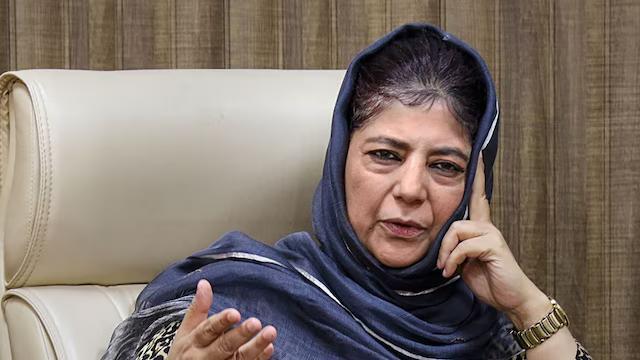
Mufti Alleges Foul Play After OGW Jumps in J&K River, Drowns; BJP Slams Her
In a shocking incident, an overground worker (OGW) was found dead after jumping into a river in Kulgam district of Jammu and Kashmir. The incident has sparked a heated debate, with former Chief Minister Mehbooba Mufti alleging foul play and the Bharatiya Janata Party (BJP) slamming her remarks.
According to reports, the OGW, who was identified as Riyaz Ahmed, was seen jumping into the river in Kulgam on Saturday morning. Despite efforts to rescue him, Ahmed’s body was recovered later in the day, with the police suspecting that he might have drowned.
However, Mehbooba Mufti, who is the president of the Peoples Democratic Party (PDP), has questioned the circumstances surrounding Ahmed’s death. In a series of tweets, Mufti alleged that locals had informed her that Ahmed was picked up by the Army two days ago, leading her to believe that foul play might be involved.
“Shocking news from Kulgam! Locals tell me that the OGW who jumped into the river was picked up by the Army 2 days ago. Is this another case of enforced disappearance or worse? What is the truth behind this tragic incident?” Mufti wrote on Twitter.
Mufti’s remarks have been strongly contested by the BJP, with party leader Sanju Verma accusing her of playing politics with sensitive issues.
“Mehbooba, after the Pahalgam terror attack, said, ‘Why blame Pakistan?'” Verma tweeted. “And now, she’s questioning the Army’s involvement in an OGW’s death. Her track record of playing with fire and fuelling separatism is well-documented. It’s time she stopped politicizing national security issues.”
The BJP’s criticism comes in the wake of a recent terror attack in Pahalgam, which killed three civilians and injured several others. The attack was widely condemned by political parties across the country, with Mufti herself strongly criticizing the incident.
However, Mufti’s allegation of foul play in Ahmed’s death has raised questions about the circumstances surrounding his death. While the police have yet to confirm whether Ahmed was indeed picked up by the Army, the incident has sparked concerns about human rights abuses in the region.
The incident is also seen as a blow to the fragile peace process in Jammu and Kashmir, which has been underway since the abrogation of Article 370 in August 2019. The move, which stripped the state of its special status, led to widespread protests and violence, with many accusing the government of trampling upon the rights of the people of Jammu and Kashmir.
In the aftermath of the incident, the government has come under intense scrutiny, with many calling for an independent investigation into Ahmed’s death. The incident has also raised questions about the safety and security of OGWs in the region, who often find themselves caught in the crossfire between security forces and separatist groups.
As the debate rages on, it remains to be seen whether the government will order an investigation into Ahmed’s death and whether Mufti’s allegations will be proven true. However, one thing is certain – the incident has once again highlighted the complexities and challenges of the situation in Jammu and Kashmir, where the lines between politics and national security are often blurred.






